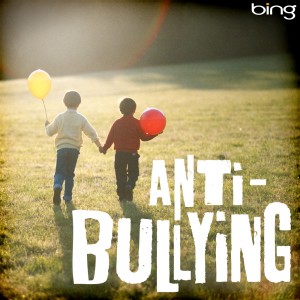Part 1 | Part 2 | Part 3 | Part 4
Here’s the final installment of this ‘expert’s‘ 4-part Bing Summer of Doing series. (Bing’s got lots of cool stuff happening through Sunday, but since the word of the week is Giving, tomorrow David and I are doing the AIDS WALK SF, so no blog from me. If you’ve missed anything I’ve served up on this shift, check out the blogs from Monday (Giving), Wednesday (Unplugging) and Friday (Urban Gardening). Today we’re talking Anti-bullying, so let’s get at it.
When stuff comes up between real friends, they show how much they value the friendship by working things out. That can be especially hard when Friend A crosses the line (knowingly or un) and Friend B is upset. But with real friends it’s worth the effort it takes to talk and listen and understand each other’s point of view.
Friendships get damaged when stuff that needs to be said is left unsaid. Unexpressed emotions don’t just fade away. Often they work like acid, silently eating away at a relationship’s foundation. We start doubting our friend’s intentions. We look for evidence to reinforce our doubts while demanding reassurances that our doubts are ungrounded. We talk about the friend instead of talking to him/her. If you’re beyond middle school, you know this crap never helps. It only makes things worse.
Kids with the stickiest peer relationship issues are 6th and 7th graders. Their interpersonal challenges have become increasingly complex. Unfortunately, their ability to resolve conflicts in their multi-tiered friendship doesn’t match the challenges they face. And so it goes in the 21st century. We communicate with more people, but the way we do it, through texting, chatting and tweeting, increases the likelihood of miscommunication, which leads to hurt, jealousy, betrayal, retaliation, AKA social garbage. Unless we learn to effectively resolve conflicts with the folks we like, we’re not going to be able to stand up for ourselves with truly aggressive people, i.e., bullies.
The following question was asked of me by a 6th grader:
What do you do if your friend is bullying you and you don’t want to hurt them?
Sounds like you’re getting hurt by a friend but aren’t willing to stand up for yourself. You’ve got to learn to be your own best friend. That means acting like you deserve to be treated with respect. This new self-respecting attitude won’t guarantee respect from others, but it does mean that when people treat you badly, you let them know it’s not OK.
You say you’re being hurt but you don’t want to “hurt” your friend by telling him/her to cut it out. I understand your hesitation. Nobody likes to be told that they’re out of line. Your friend might get mad at you and that’s never pleasant. S/he might say, “I don’t know what you’re talking about.” In which case you’re left feeling confused and embarrassed. Your friend might even accuse you of trying to “ruin” the friendship and may turn other friends against you. OR… s/he might stop and think about what you’ve just said and make some positive changes. That would be a good thing, right? But when we stay silent about things that are bothering us, the person who is ‘bullying’ continues to bully. Things usually just stay the same or get worse. But when we’re brave enough to risk standing up for ourselves (or for others who are being mistreated) we open the door for change.
Back to the question from the 6th grader. How would you have handled that situation when you were 11? How does the question and my advice, apply to any of your current relationships? Funny how our middle school experience can sometimes feel like it all happened in another lifetime… to someone else. Or it can feel like we’re still right there. sigh.













A good post – as usual. Self respect leads to self esteem which leads to the kind of inner strength that we need to be able to stand up for ourselves. Parents are the ones who can set a child on this path. I’ve almost finshed a series of posts on dealing with bullying in a way that develops this kind of inner strength.
Comment by Tahlia Newland — July 14, 2012 @ 5:38 pm